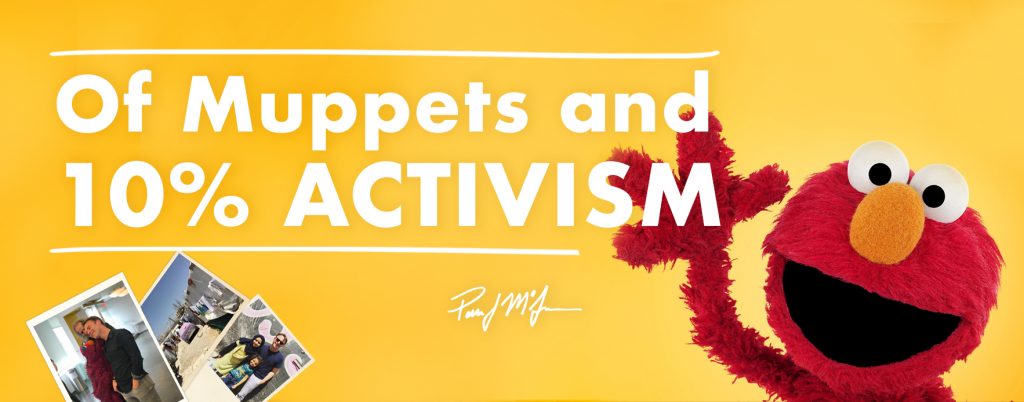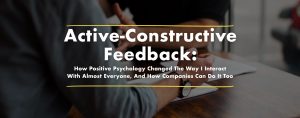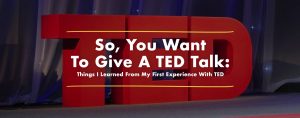My Dinner With Elmo:
From A Syrian Refugee Camp to 10% Activism with Sesame Street

No matter your politics, age, gender, social class, or background, if you’ve got a TV or computer screen and a heart in your chest, you probably love Sesame Street. Sesame Street celebrates its 50-year anniversary this year. Way back in 1969, Sesame Street debuted on the Public Broadcasting Service. It was the very first children’s television show to be written and produced with an educational curriculum. It was also one of the first kids’ shows to depict diverse, integrated communities of children learning and playing together as friends.
Sesame Street runs deep. 86 million of Americans alive today watched the show as children - and Americans of all ages have shown it to roughly 95% of their kids. It’s taught 3 generations (and counting) everything from basic math, colors, and English literacy to autism awareness, good manners, citizenship, and self-care. Research has shown that Sesame Street has had a supplemental effect on the educational outcomes of nearly every child that’s seen it, giving these children a boost in nearly every area of early education. Sesame’s success isn’t limited to the United States - the show, and partner programs, are distributed in over 140 countries around the world.
Sesame Street was originally developed using a then -unique production approach that became known as the CTW model (after the organization’s original name, Children’s Television Workshop): collaborative planning and evaluation of outcomes by producers, writers, educators, and researchers. The success of this model gave rock-solid credibility to the principles that have guided the show’s content since the beginning: making kids smarter, stronger, and kinder.
While I love this mission today, it wasn’t particularly on my mind in July 2017 when I visited a refugee camp in Lebanon’s Bekaa Valley for Syrians who were displaced by the ongoing war in their homeland. I was in Beirut attending a conference as a volunteer for an organization that I truly love - Endeavor Global. It’s one of my 10%s - albeit a nonprofit one. Although the conflict in Syria has largely faded from American media attention today, it was fresh in my consciousness during my visit. I asked my friend Tanya, who works on the issue, if I could visit some of the camps; I wanted to see and understand their realities for myself. Thanks to some of her local connections, I was able to walk through the ad hoc “neighborhoods” of the camps, meeting friendly faces at nearly every turn. I quickly learned that these were largely members of Syria’s educated middle class doing their best to recreate “normal” in the situation in which they found themselves.


When we as adults think about kids, we inevitably view them through the lens of their imagined future: their potential, the contributions they’ll make to society, and the dreams they’ll form and pursue. Few of these are considerations for kids in refugee camps. I met so many bright, talented young people who, if I’d met them under other circumstances, would be easy to imagine as future successes: programmers, entrepreneurs, scientists. But all of these kids had their education interrupted or stalled, for an indefinite period of time, due to their removal to the camps. Many hadn’t been in school in years since they had to work in the fields in order to generate earnings for their families. They were also often unwelcome in the already crowded local schools in the area. Even if peace returned to Syria tomorrow, every one of these kids would be vastly behind their peers in their adult outcomes, assuming they were able to complete their educations at all. This pervasive gap was killing their futures.
I returned to my hotel that day deeply saddened by what I’d seen. I wondered how I might make a difference, but I wasn’t sure. I decided to wait it out - I would keep my eyes open and watch for opportunities to help in my travels or in my daily life. A year later, it came from a rather unexpected place. As I’ve mentioned in the past, I’m very active as a fundraiser, volunteer, and organizer within the Harvard Business School alumni community: I’m passionate about the school’s mission to create leaders who will make a difference in the world - whether in business or in society at large. I also love the people who work at HBS and had become particularly close to two women from Maine - Chava and Alicia - who left the school to join the team at Sesame Workshop, the nonprofit behind Sesame Street that invests the show’s revenues into programs that help kids around the world.
In December 2017, Sesame Workshop was awarded a $100 million grant by the MacArthur Foundation, specifically to boost their work with the International Rescue Committee in providing early educational interventions to displaced kids in the Syrian response region in the Middle East. It was the largest grant of its type in history. Soon after, Sesame received another $100 million from the LEGO foundation to expand these programs to children in the Rohingya refugee community in the Syrian theatre, and later to kids in Bangladesh as well.
I knew in my gut that what Sesame Workshop was doing was exactly the kind of program that would fundamentally change the trajectory of kids like those I’d met the year before in Lebanon. When I met with Chava and Alicia to learn more about Sesame, they surprised me by asking me if I would consider becoming a founding member of the Sesame Workshop Leadership Council. The Leadership Council is a board of fellow Sesame lovers that invests their energy and their networks for outreach, fundraising, and any thing else that can help Sesame in its mission. I didn’t hesitate - I said yes.
That’s why this May I celebrated the 50th anniversary of one of television’s most enduring gifts to children at a gala featuring some of the greatest personalities of Sesame Street, both human and Muppet. It was epic! I got to rub elbows with Maria and Bob, spill drinks with Grover and Elmo, and see a musical performance by John Legend and Big Bird (Big Bird has a great voice). The following day, at a workshop for the Leadership Council, I learned about Sesame’s operations and ambitions from the leadership team and brainstormed with my colleagues about how we could help. As a bonus, I even got to hang out with Telly and then become an apprentice Muppetteer through a workshop with a long-time cast member of the show.


There are two big reasons I’m sharing this story. The first is to pass on a lesson I’ve learned from 10%ing that continues to pay dividends, whether it’s getting to share appetizers with Oscar the Grouch or visiting amazing places around the world: you can never predict the long-term possibilities and opportunities that will appear when you volunteer, participate, or otherwise give your time. Working with Endeavor and HBS brought me directly to Sesame Street in a very unpredictable way. That’s why I always try to remind myself that when you get involved in organizations that are doing important work in society, you can make connections that can lead to adventures years down the line, or fulfill dreams you never thought possible.
The second is to wish Sesame Street and the Sesame Workshop a very happy 50th anniversary and encourage every one of you, if this story has inspired you, touched you, or simply reminded you of the wonderful things Sesame did for you when you were a kid, to contribute to this amazing organization. At a very minimum, head to YouTube and watch this.
And then, rock out with the gang at NPR’s Tiny Desk.
See you in the world!




